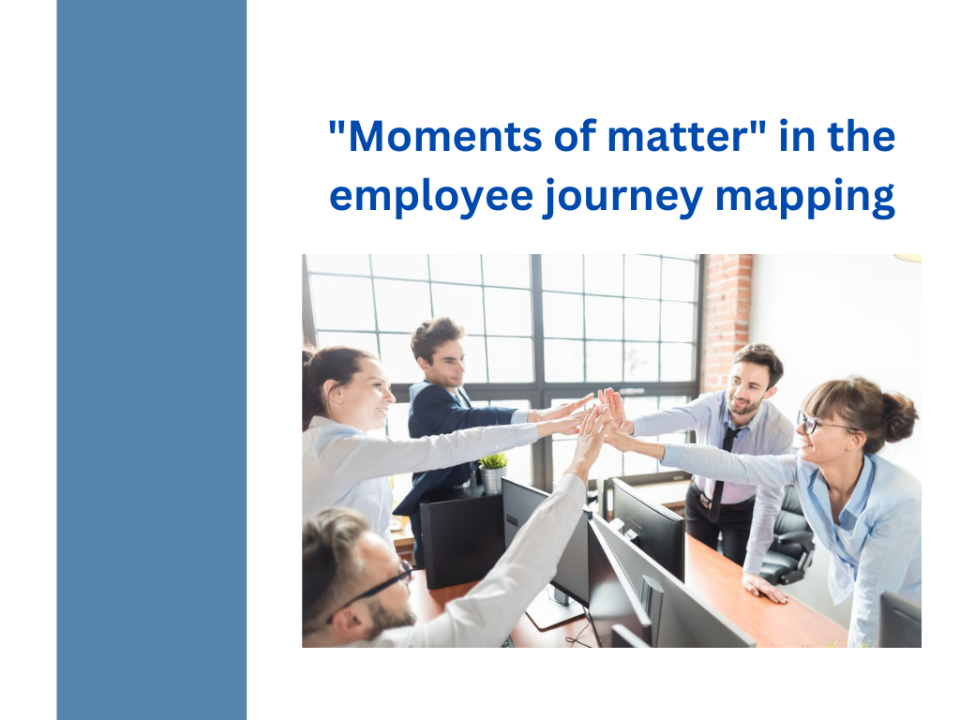
"Moments that matter" in the employee journey mapping
The first day on the job is what we refer to as a “Moment that Matters.” Moments that Matter are experiences that have the greatest potential impact on employees and as such, they tend to be the most emotional and the most memorable.
Moments that Matter are the molecules that make up the Employee Experience - and over time, determine how positive or negative it is.
Think about your own organization for a moment.
what are the Moments that Matter the most in your business?
If you’re not sure what they are, or which are most critical to your organization, there are a few things you can do. In HR, "moments that matter" are important moments in the employee journey that notably impact the employee experience and engagement.

Often, moments that matter is related to emotionally charged events in people's professional or personal lives. Research shows that employers' behavior in relation to these moments profoundly affects employee engagement, employee satisfaction, and employee retention.
Examples of moments that matter in the employee experience
Moments that matter can be divided into professional and personal moments.
Examples of professional moments that matter:
- The first day on a new job
- A promotion
- Ending or starting a new project
- A performance appraisal
- Receiving feedback
- A service anniversary
- Ending an employment
Professional moments that matter present valuable opportunities for employers to create a memorable and positive impact on their employees' lives.
A classic example is the onboarding process, which has a massive impact on the employee experience. And yet, many organisations struggle to give this process the attention it deserves.
Another example of leveraging moments that matter is in delivering feedback to employees. In a Glassdoor survey, 53% of employees say they would stay longer at their company if they received more appreciation from their boss.
Examples of personal moments that matter:
- Becoming a parent
- Losing a loved one
- Relocating to a new country
- Going through a divorce
- Illnesses and accidents
Personal moments that matter are often even more impactful on a person's life. Organisations need to acknowledge that we're all human and our personal lives affect our professional lives.
Failing to do so will inevitably create a negative employee experience and possibly prompt the employee to start looking for a more empathetic employer.

"In short, emotions matter," said McEwan. "While there is no 'magic' moment, most moments that matter elicit a strong emotional response and have a lasting effect on employees' opinions of their organisation."
Why Are Moments That Matter Important?
So why do exactly Moments of Matter?
First of all, they are important to your employees. How the company approaches them in those crucial moments will shape their opinion and feelings towards the employer.
From the organization’s point of view, there are many benefits of acknowledging and celebrating Moments That Matter. Here are the biggest advantages they bring.
1- Employee turnover
As every HR Professional probably knows, employee turnover is costly. When they leave, employees take their experience and knowledge with them.
So, what can you do to decrease employee turnover?
For one, you can start recognizing your employees.
Namely, 32% of employees leave their jobs because they are unsatisfied with the recognition for their contributions.

2- Happier employees
Being mindful of Moments That Matter can also increase employee happiness. With a well-rounded employee experience, employees are more likely to feel like they are making a meaningful contribution to their organizations, and they are more likely to develop better relationships with their coworkers.
3- Improved employer branding
Are you aware that one of the biggest issues organizations are facing these days is recruitment?
Namely, 83% of HR Pros say they are facing recruiting difficulties, and 75% of those say that there is a shortage of skills in candidates for job openings.
Insisting on the Moments That Matter concept is useful because it helps you improve your employees’ experience. When employee experience is satisfactory, your own employees become your organization’s ambassadors.
They encourage their friends or acquaintances to come to work for you, thus saving you valuable recruitment resources and increasing chances of cultural fitness.

What Moments Matter In Your Organization?
As mentioned before, every company is different. Therefore, every organization should identify Moments That Matter for its own employees, and decide how they will be marked. So, how can you start?
Besides intuitively focusing on a strong onboarding process and work anniversaries, dig deeper.
Conduct an employee survey and find out where you are missing out. What moments matter to your employees?
Moreover, how did they feel in specific moments, like during onboarding, when completing their 10th project, when they received negative feedback, and
how can your organization support them during these?